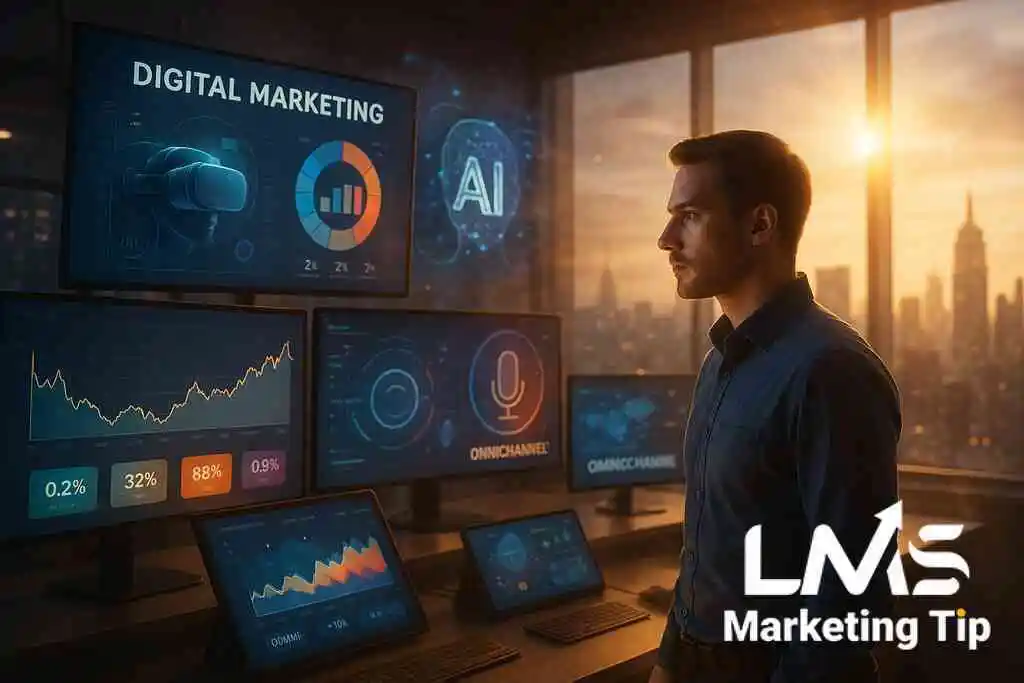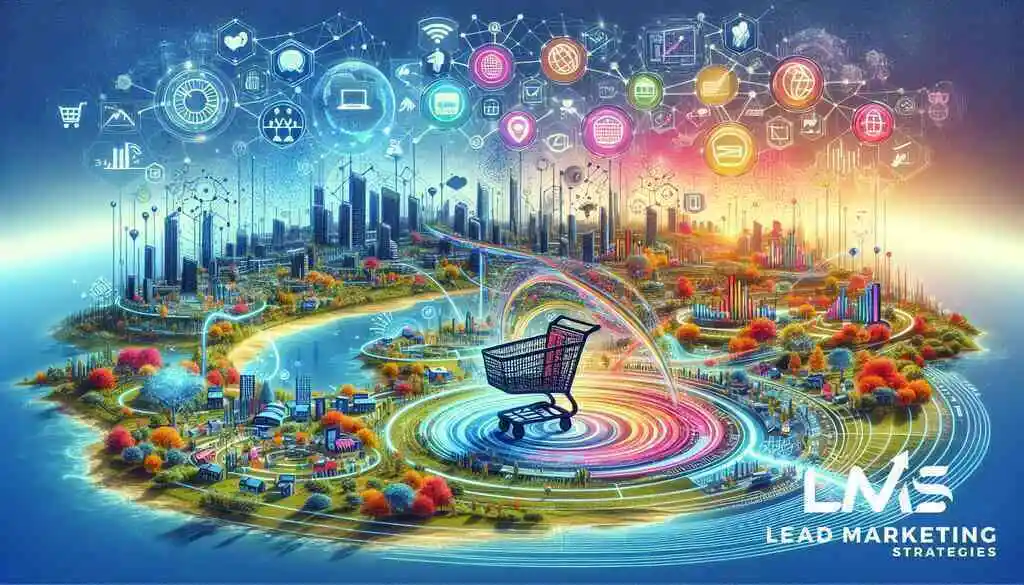
Unveiling the Future of Lead Marketing
Introduction to the Evolution of Marketing
The marketing landscape has experienced significant transformations over the years, driven by technological advancements and evolving consumer behaviors. In the digital age, marketing has shifted from traditional methods to more dynamic, personalized, and data-driven approaches. The rise of the internet and social media platforms has further accelerated this evolution, creating new opportunities for marketers to reach and engage their target audience effectively. As we approach 2025, it’s clear that the future of lead marketing will be shaped by cutting-edge strategies and tools that enhance brand connectivity and consumer relationships.
The Role of Digital Innovations in Marketing
Digital innovations play a pivotal role in redefining marketing strategies and are crucial for businesses aiming to stay competitive in an ever-changing environment. Technologies like artificial intelligence (AI) and machine learning are transforming how marketers analyze data and generate insights, allowing them to create more targeted and personalized campaigns. In addition, marketing automation tools, such as those offered by Lead Marketing Strategies, enable seamless and efficient campaign management, reducing human error and increasing ROI. These innovations are not just tools but integral components of a comprehensive digital marketing strategy capable of driving measurable results.
Why 2025 is a Pivotal Year for Lead Marketing
The year 2025 promises to be a turning point in the world of lead marketing, with numerous factors positioning it as a landmark year. The convergence of AI, data analytics, and digital platforms will enable marketers to anticipate customer needs accurately and engage with them through personalized experiences. This shift will be crucial in establishing brand loyalty and driving long-term growth. Furthermore, as technologies like blockchain and augmented reality gain more prominence, marketers will have new avenues to explore and innovative ways to interact with their audience. The focus on sustainability and green marketing initiatives will also rise substantially, requiring marketers to align their strategies to meet eco-conscious consumer expectations.
Harnessing the Power of Advanced Technologies
AI in Lead Generation: The New Frontier
The integration of artificial intelligence (AI) into lead generation represents the new frontier for marketers. AI technologies are revolutionizing how businesses identify and engage potential customers by providing insights into consumer behavior patterns. By leveraging AI algorithms, marketers can sift through large volumes of data to uncover valuable trends and predict which leads are most likely to convert. The power of AI in lead marketing services lies in its ability to automate routine tasks, freeing up valuable human resources for more strategic planning. As AI continues to evolve, we can expect more sophisticated applications to enhance lead generation processes, making them more efficient and effective.
Marketing Automation Tools for Effortless Campaigns
Marketing automation tools have become essential in crafting streamlined, effective campaigns. These tools help businesses automate repetitive tasks, such as email marketing, social media posting, and lead nurturing, allowing marketing teams to focus on strategic and creative duties. Automation not only increases efficiency but also enhances the precision of marketing efforts, ensuring messages are sent to the right audiences at the optimal times. By utilizing these tools, like those available from Lead Marketing Strategies, businesses can significantly enhance their campaign management and execution, resulting in improved engagement and conversion rates.
Predictive Analytics: Anticipating Customer Needs
Predictive analytics has emerged as a cornerstone of modern marketing strategies, enabling businesses to anticipate customer needs before they even arise. By analyzing historical data, predictive models can determine future patterns and behaviors, offering marketers actionable insights to guide decision-making. With tools like Predictive analytics in digital marketing, businesses can refine their strategies to better align with customer demands, improving both customer satisfaction and ROI. This technology empowers marketers to move from reactive to proactive strategies, positioning their brands ahead of the curve.
Blockchain in Marketing: A Secure Future
Blockchain technology is paving the way for a more secure and transparent marketing ecosystem. By utilizing decentralized ledgers, blockchain can ensure the authenticity of digital transactions and protect consumer data privacy. This technology can enhance trust between brands and customers by verifying the provenance of digital content and ad impressions. The role of Blockchain technology in marketing will continue to grow, providing marketers with new tools to authenticate brand interactions, reduce fraud, and form more transparent relationships with their audiences.
Augmented Reality: Transforming Customer Experience
Augmented reality (AR) is set to transform how customers interact with brands by overlaying digital information in real-world environments. This technology offers immersive experiences that allow consumers to visualize products in their own spaces before making a purchase. From virtual try-ons to interactive product demonstrations, AR enriches the shopping experience, leading to increased customer engagement and satisfaction. As augmented reality technologies advance, their integration into marketing strategies will become more pervasive, offering marketers new ways to captivate and engage their audience.
Redefining Customer Engagement
Omnichannel Marketing Approaches for Seamless Interaction
Omnichannel marketing approaches are crucial for creating seamless interactions between brands and consumers. By integrating various channels-online and offline-businesses can provide a consistent experience, enhancing customer satisfaction and loyalty. This strategy involves synchronizing communication across platforms such as social media, email, and physical locations to meet customers where they are. The omnichannel marketing approaches in lead generation offered by Lead Marketing Strategies ensure that your brand message remains consistent, which is vital for building trust and prompting action among consumers. Linking consumer data from different sources helps create a unified view of the customer journey, enabling businesses to deliver tailored experiences at each touchpoint.
Personalized Marketing Strategies: Building Deeper Connections
In today’s highly competitive market, personalized marketing strategies are essential for building deeper connections with audiences. By leveraging data analytics, businesses can understand individual preferences and craft bespoke communication that resonates with customers on a personal level. Personalization goes beyond just addressing customers by name; it involves curating content and offers that align with their unique needs and buying behaviors. Through technologies such as AI and machine learning, marketers can predict customer intent and offer highly relevant recommendations, enhancing engagement and conversion rates. This tailored approach fosters brand loyalty and can result in increased lifetime value, positioning businesses as customer-centric leaders.
Interactive Content Development: Engaging Audiences Creatively
Interactive content is redefining the way audiences engage with brands, providing a platform for creativity and innovation. This type of content-be it quizzes, polls, or interactive videos-invites users to participate actively, thus enhancing engagement and retention. By fostering a two-way interaction, businesses can capture valuable data and insights into customer preferences and behaviors. The use of interactive content for audience engagement allows brands to not just tell their story, but to make audiences a part of it. By encouraging interactions, brands can drive deeper emotional connections with their consumers, ultimately resulting in a more loyal customer base.
Voice Search Optimization: Capturing the Vocal Browsing Boom
With the rise of smart speakers and voice-activated devices, optimizing for voice search has become more critical than ever. Voice search optimization involves tailoring your digital content to recognize and cater to longer, conversational queries typical of voice searches. As more consumers turn to voice search for convenience, businesses must adapt their SEO strategies to capture this growing segment. This includes optimizing content for natural language processing and integrating structured data for better recognition by voice search technologies. Implementing voice search optimization strategies ensures that your content remains relevant and easily discoverable, enabling you to capitalize on this blooming trend.
Video Marketing Strategies: Visual Storytelling in 2025
Video marketing strategies will continue to evolve as a powerful tool for visual storytelling by 2025. Audiences are increasingly favoring video content for its dynamic and engaging nature that words alone cannot capture. With advancements in technology, brands can create interactive and immersive video experiences that captivate and inform their audience. The concept of video marketing transformation in 2025 emphasizes using video content not just narratively, but as a platform for audience interaction and engagement. From live streaming to augmented reality integrations, video marketing offers countless possibilities for innovation and connection, ensuring brand messages are not only seen but experienced.
Leveraging Data for Strategic Insights
Data-Driven Marketing Tactics: Informed Decision Making
In today’s rapidly evolving digital landscape, data-driven marketing tactics have emerged as the cornerstone of informed decision-making. By harnessing vast amounts of data, businesses are empowered to uncover insights that drive strategic actions. The ability to analyze consumer behavior, market trends, and competitive landscapes provides a competitive edge that is unparalleled. By leveraging data-driven marketing insights, businesses can refine their approaches to targeting and engaging their audience, ensuring that marketing strategies are both effective and adaptable. As digital marketing fundamentals evolve, companies must stay agile, continuously refining their tactics to align with emerging trends and technologies.
Customer Journey Mapping: The Path to Understanding
Customer journey mapping is an invaluable tool for gaining a comprehensive understanding of the customer experience. By visualizing the various stages a consumer navigates, businesses can identify pain points and opportunities for engagement. This strategic process involves dissecting each touchpoint a customer encounters, allowing companies to tailor their offerings and improve overall satisfaction. A meticulous approach to customer journey mapping ensures that every interaction is optimized, fostering stronger relationships and enhancing brand loyalty. As marketing services become increasingly complex, a keen understanding of the customer journey will remain critical in delivering meaningful and personalized experiences.
Programmatic Advertising Trends: Automated Precision
The evolution of programmatic advertising trends is reshaping how marketers achieve precision and efficiency in their campaigns. Programmatic advertising automates the buying and selling of ad space, utilizing algorithms to target specific audiences at the right time. This approach not only maximizes ad spend but also increases engagement and conversion rates by delivering highly relevant content. By integrating programmatic advertising advancements into their marketing strategies, companies can achieve a higher ROI and more effectively reach their target audience. As automation technologies advance, we can expect programmatic advertising to become even more integral to successful marketing campaigns in the future.
Content Personalization Trends: Crafting Unique Experiences
In an era where consumers are overwhelmed with content, personalization has become a pivotal strategy for standing out. Content personalization trends involve crafting unique experiences tailored to individual preferences and behaviors, transforming generic messages into personalized engagements. By leveraging data and technology, marketers can deliver customized content that resonates on a personal level, enhancing user engagement and driving conversions. The ability to provide relevant recommendations and insights is critical for building lasting connections with consumers. As brands strive to enhance their connection with audiences, content personalization remains at the forefront of effective marketing strategies.
Innovations in Brand Building and Loyalty
Loyalty Marketing Advancements: Ensuring Long-term Engagement
Loyalty marketing has evolved beyond mere rewards programs, becoming a foundational strategy for ensuring long-term consumer engagement. In 2025, we can expect to see brands leveraging advanced analytics to understand customer behavior deeply, tailoring their loyalty offerings accordingly. By integrating technology with human insights, businesses will craft personalized loyalty experiences that resonate with their audience’s values and aspirations. The emphasis will be on establishing emotional connections, fostering communities around shared interests. As brands continue to innovate, loyalty marketing advancements will not only incentivize purchases but also create genuine brand advocates.
Influencer Marketing Evolution: Authentic Connections
The influencer marketing landscape is undergoing a significant transformation, driven by a desire for authenticity and genuine connections. By 2025, brands will increasingly collaborate with micro-influencers who have loyal, niche followings, rather than relying on celebrities with mass appeal. This shift is enabling more authentic brand storytelling and deeper consumer engagement. Companies will focus on authentic connections by choosing influencers whose values align with their brand ethos. This evolution prioritizes transparency and trust, essential components of modern marketing strategies. Influencers will continue to play a pivotal role in shaping brand perceptions and driving consumer purchase decisions.
Creative Social Media Campaigns: Capturing Attention in New Ways
Social media platforms have become indispensable tools for brands aiming to capture consumer attention creatively. In the realm of branding and marketing innovation, creative social media campaigns stand out by offering unique, engaging content that resonates with users. By 2025, businesses will explore novel formats and interactive features to enhance their social media presence. This includes leveraging live videos, ephemeral content, and user-generated content to foster dynamic engagement. Brands will use these platforms not only as marketing tools but also as a means to gather insights and respond to evolving trends and consumer sentiments.
Green Marketing Initiatives: Aligning with Eco-Conscious Consumers
The increasing relevance of sustainability is prompting brands to invest in green marketing initiatives. As eco-conscious consumers demand transparency, brands are aligning their strategies to reflect environmental responsibility. By 2025, businesses will actively seek to reduce their carbon footprint and present these efforts authentically. This includes sustainable packaging, carbon-neutral operations, and environmentally friendly sourcing. Communicating these initiatives effectively through marketing channels will be crucial. Consumers are more likely to support brands that are sincerely committed to sustainable practices, making green marketing a significant trend in shaping brand reputations.
Experiential Marketing Strategies: Creating Memorable Interactions
As digital interactions proliferate, experiential marketing strategies offer consumers tangible, memorable experiences. By 2025, brands will utilize immersive technologies such as virtual and augmented reality to create engaging experiences that blend the virtual with the physical. These strategies emphasize participation and immersion, allowing consumers to experience the brand in novel ways. Events, pop-up shops, and interactive installations will be central to these efforts, fostering deeper emotional connections. By prioritizing experiential marketing, brands can differentiate themselves in a crowded marketplace, building lasting memories and encouraging strong brand loyalty.
Conclusion: Embracing the Future of Marketing
Summary of Key Trends in 2025
As we look towards 2025, the landscape of lead marketing is on the cusp of transformative changes driven by technological advancements and shifting consumer expectations. Key trends such as AI in lead generation, marketing automation, predictive analytics, and voice search optimization are setting new standards for efficiency and engagement. Augmented reality is revolutionizing customer experiences, while data-driven tactics and personalized content elevate the consumer-brand relationship. Brands are increasingly focusing on experiential marketing and sustainability, aligning with eco-conscious values through innovative green marketing initiatives. These trends highlight the necessity for marketers to adapt and innovate, ensuring they remain competitive in an ever-evolving digital ecosystem.
The Imperative of Staying Ahead in Marketing Innovation
In the rapidly changing world of marketing, staying ahead of innovation is imperative. Embracing new technologies like Digital marketing fundamentals, will be crucial for businesses looking to enhance their digital presence. Marketing agencies, especially those like Lead Marketing Strategies, play a vital role in navigating these innovations. Their expertise in implementing cutting-edge strategies is critical in helping businesses maintain a competitive edge. By continuously exploring and integrating emerging technologies, companies can optimize their marketing efforts, ensuring they meet the evolving needs of their target audience. This proactive approach not only enhances brand visibility but also fosters customer trust and loyalty.
A Call to Action: Implementing Forward-Thinking Strategies
As we advance into 2025, it’s essential for businesses to embrace and implement forward-thinking marketing strategies. By partnering with a Lead marketing strategies company, businesses can leverage a comprehensive suite of services tailored to modern marketing demands. From personalized marketing tactics to seamless omnichannel approaches, the integration of innovative strategies is non-negotiable for sustained growth and success. The call to action is clear: act now, adapt, and thrive in a digital era where consumer expectations continually rise. Businesses are urged to adopt these strategies, ensuring they do not just participate in but lead within the future marketing space.
Frequently Asked Questions
Question: How can artificial intelligence be leveraged in lead generation strategies for 2025?
Answer: At Lead Marketing Strategies, we integrate cutting-edge artificial intelligence in lead generation to revolutionize the way businesses identify and engage potential customers. By utilizing AI techniques, we analyze vast amounts of data to uncover patterns and predict which leads are most likely to convert. This enables us to target our campaigns more effectively, ensuring that our clients receive the highest return on their investment. Our advanced AI-driven tools allow for automation of routine tasks, freeing up your team’s resources for more strategic and creative endeavors. Whether you’re in real estate marketing, bank marketing, or any other industry, our AI solutions help deliver measurable results and enhance your digital marketing plans.
Question: What role does predictive analytics play in crafting a successful digital marketing strategy?
Answer: Predictive analytics is an integral part of a successful digital marketing strategy as it allows businesses to anticipate customer needs before they arise. At Lead Marketing Strategies, we use predictive models to analyze historical data and determine future patterns and behaviors. This proactive approach helps refine marketing strategies to align better with customer demands, improving customer satisfaction and enhancing ROI. By implementing predictive analytics, our clients in sectors like solar marketing and plumbing marketing can stay ahead of the competition by offering tailored solutions that resonate with their target audience. This not only boosts brand awareness but also ensures long-lasting relationships with consumers.
Question: How does Lead Marketing Strategies utilize marketing automation tools for enhanced campaign management?
Answer: At Lead Marketing Strategies, we harness the power of marketing automation tools to streamline campaign management and execution across various industries, such as daycare marketing and law firm marketing. Marketing automation allows us to manage repetitive tasks like email marketing, social media posting, and lead nurturing with precision and efficiency. By automating these processes, we ensure that our clients’ messages are delivered to the right audience at optimal times, maximizing engagement and conversion rates. Our focus on automation not only enhances the efficiency of marketing efforts but also allows businesses to allocate more resources to strategic initiatives, driving long-term growth in a competitive digital landscape.
Question: What are some of the top lead marketing trends for 2025 discussed in your blog ‘What Are the Top Lead Marketing Trends for 2025’?
Answer: In our blog ‘What Are the Top Lead Marketing Trends for 2025’, we delve into several transformative trends shaping the future of lead marketing. Key trends include the rise of AI in lead generation, the increasing importance of marketing automation tools, and the necessity for omnichannel marketing approaches to ensure seamless interactions. Furthermore, the integration of technologies such as augmented reality and blockchain promise to transform customer experience and secure marketing ecosystems, respectively. At Lead Marketing Strategies, we are committed to helping businesses adapt and thrive by staying at the forefront of these trends, offering innovative solutions that align with evolving consumer expectations in industries like political marketing and landscaping marketing.
Question: How can businesses effectively utilize omnichannel marketing approaches to enhance customer interaction?
Answer: Omnichannel marketing approaches are essential for businesses looking to enhance customer interaction by integrating various online and offline channels. At Lead Marketing Strategies, we specialize in creating cohesive and consistent experiences across different platforms such as social media, email, and physical locations. By synchronizing communication and linking consumer data, we help businesses like NFT marketing and auto shop marketing create a unified view of the customer journey. This strategy not only boosts customer satisfaction and trust but also prompts action among consumers, driving engagement and loyalty. Our comprehensive suite of services and expertise in omnichannel marketing ensures that businesses can effectively meet their consumers where they are and deliver personalized, meaningful interactions.











